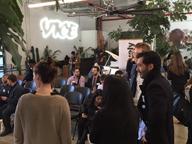Faculty News
—
Professor Scott Galloway discusses the impact of the FBI breaking into a secured iPhone on the Apple brand
—

Excerpt from Associated Press -- "Scott Galloway, clinical professor of marketing at NYU Stern School of Business, said Apple risked public sentiment turning against the company as people became more informed about the case, and particularly if Apple lost. For now, he said, 'the line isn't going to be any shorter for the iPhone because the FBI in concert with a third party figured out a way to hack into one phone. I haven't heard anybody say "That's it, I'm switching to Samsung."'"
Faculty News
—

Excerpt from Associated Press -- "Scott Galloway, clinical professor of marketing at NYU Stern School of Business, said Apple risked public sentiment turning against the company as people became more informed about the case, and particularly if Apple lost. For now, he said, 'the line isn't going to be any shorter for the iPhone because the FBI in concert with a third party figured out a way to hack into one phone. I haven't heard anybody say "That's it, I'm switching to Samsung."'"




















